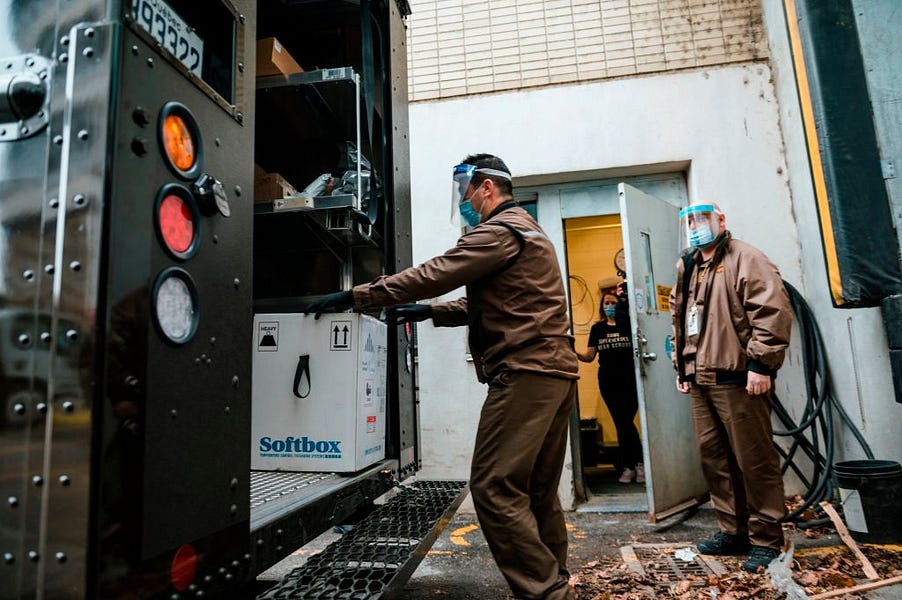Call me crazy, but I’m feeling a little optimistic as we wrap up this week. It was impossible not to feel emotional watching delivery trucks pull up to hospitals and wheel out cases of the Pfizer/BioNTech vaccine to be administered to the health care workers who have been putting themselves at risk for the last 10 months. If you didn’t feel so inspired, let me recommend watching one set to ESPN’s NBA theme. (But really, has no one out there dropped in “Eye of the Tiger” as background music?)
If this pandemic were a movie, we’d be approaching the denouement phase. We’d have a montage of people lined up for jabs in the arm, and maybe even some slo-mo video of people walking away, ripping off their masks, and pumping their fists in the air. As the credits rolled, we’d see people coming out of their houses and hugging their neighbors, shots of bustling town centers, and of kids pouring out of school buses and running into their teachers’ arms.
This ain’t a movie. At best, we’re headed into the final act of this dark drama. The photos and videos of people getting vaccinated stand in contrast to the grim reality of full ICUs and unfathomable daily death tolls. In a movie, a vaccine or cure would be available everywhere at the same time. In reality, we know it’s going to take months to get enough people vaccinated even if everything goes flawlessly.
And, well, it hasn’t. It took only a couple days for confusion to set in as states were told that their second rounds of shipments would be reduced, with Trump administration officials pointing to scheduling issues based on Pfizer’s production schedule and Pfizer pushing back with claims that it had enough vaccines but was awaiting shipment instructions. I’m with everyone who suggested that we should have let Amazon and Chick-fil-A handle the distribution.
We have yet to see whether this will be a hiccup or whether it portends real problems with vaccine distribution. Let’s hope it’s the former, because there are about to be millions more doses available: The FDA has approved the Moderna vaccine, which has nearly the same efficacy as Pfizer’s but has the advantage of not needing to be kept in super-cold storage.
Even without hiccups, we were never going to get that dramatic movie-style ending to this crisis. Sure, I think many of us imagined there would be when this all ended. We’d “flatten the curve” in a couple of weeks or, at worst, a couple of months and the virus would vanish. That hasn’t happened, and it won’t. So we have to take our victories where we can get them. And the vaccines are real victories.
Now, for our best stuff from the last week.
Donald Trump has been a polarizing figure for the GOP since he descended that golden elevator and threw his MAGA hat into the ring in 2015. But his election loss last month has exacerbated those tensions to the point that some state Republican party operatives are in open conflict with their own elected Republican officials. Declan dives into what’s going on in Arizona, where party boss Kelli Ward has attacked GOP Gov. Doug Ducey, and in Georgia, where state party chair David Shafer has gone after Secretary of State Brad Raffensperger. “It’s easy enough for Republican politicians and activists like Shafer and Ward to lob rhetorical bombs at election officials. It cements their MAGA bona fides, and forces someone else to deliver the base the bad news about Trump’s loss.”
Gather round while Timothy Sandefur tells the story of a president who “had little if any governing philosophy at all. He was a brilliant manipulator of people, both in person and en masse, but he combined his affable demeanor with an almost total ignorance of economics and a cynical willingness to exploit his authority.” Did you guess FDR? You should have. To provide some context to the annus horribilis that 2020 has been, Sandefur takes readers back to the 1930s, when Roosevelt channeled his inner authoritarian and “closed banks, took the country off the gold standard, and began dictating arbitrarily how much the dollar would be worth,” among other things.
News broke this week Russia had managed to hack into the Defense, Treasury, and Commerce Departments, among other agencies. As tempting as it is to get our hackles up and demand a response, Jack Goldsmith asks us to take a deep breath and consider something important: Russia’s actions are no different from what the U.S. does, or attempts to do, to our adversaries on a regular basis. “Peacetime government-to-government espionage is as old as the international system and is today widely practiced, especially via electronic surveillance. It can cause enormous damage to national security, as the Russian hack surely does. But it does not violate international law or norms,” he writes.
One of the more surprising results of the 2020 election is that the Democrats lost seats in the House of Representatives and are entering the 117th Congress with just a slim majority. What does that mean for their agenda? It could go a couple ways. In her first piece for The Dispatch, Haley Byrd Wilt (get used to that name) writes that we should expect to see Speaker Nancy Pelosi “impose an even more top-down, predetermined process than the chamber has seen in recent years.” But she adds that the narrow margin also means that small groups of legislators can band together to make their priorities heard.
And the best of the rest:
-
In Capitolism (🔒), Scott Lincicome tackles the thorny issue of farm subsidies. While it might sound like good news that farm incomes are at their highest level since 2013, there’s a big downside: “This year, farmers (on net) will derive almost 40 percent of their income directly from the U.S. government.” The problem with subsidies is that they go mostly to wealthy farmers, they create trade conflicts, and they harm poor countries.
-
In the midweek G-File(🔒), Jonah looks at the problems that crop up when people treat politics and government with religious fervor. It’s a complaint many on the right make about progressives, but conservatives have been guilty too during the Trump era. “I’ll put it this way: I have all the respect in the world for people who believe Donald Trump should behave more like Jesus. I am a total loss as to how people can want Jesus to be more like Trump.”
-
Robert Tracinski highlights the problems of telling people they are “selfish” when they disregard the precautionary measures most of us are taking during the pandemic. Yes, it’s inconsiderate not to wear masks. But selfishness also implies something that benefits one’s self interest, and, “If you tell people that self-interest is evil, they will tend to conclude that evil is in their self-interest.”
-
We don’t mention The Morning Dispatch enough in this newsletter. But if you didn’t see this week’s concise explanation of the FTC’s lawsuit against Facebook, do go check it out. And on Tuesday, the crew worked overtime to tackle both the Russian hacking and Attorney General Bill Barr’s resignation.
-
On the pods: Jonah talked to Scott Winship of AEI on The Remnant about the persistence of poverty in the U.S. and what can be done. The Dispatch Podcast gang welcomes Declan to talk about his GOP civil war piece in one episode and Haley to talk about her article on the Democrats in another. David and Sarah talked sports on Advisory Opinions, but don’t worry: It’s (mostly) in the context of legal nerdery.







Please note that we at The Dispatch hold ourselves, our work, and our commenters to a higher standard than other places on the internet. We welcome comments that foster genuine debate or discussion—including comments critical of us or our work—but responses that include ad hominem attacks on fellow Dispatch members or are intended to stoke fear and anger may be moderated.
You are currently using a limited time guest pass and do not have access to commenting. Consider subscribing to join the conversation.
With your membership, you only have the ability to comment on The Morning Dispatch articles. Consider upgrading to join the conversation everywhere.